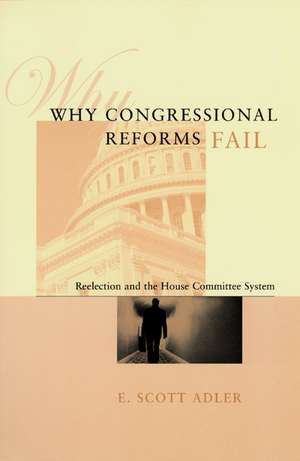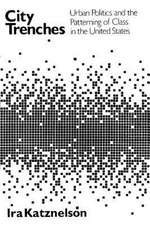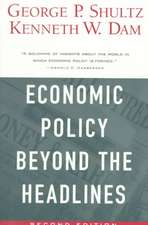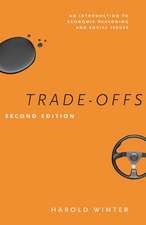Why Congressional Reforms Fail: Reelection and the House Committee System: American Politics and Political Economy Series
Autor E. Scott Adleren Limba Engleză Paperback – 11 aug 2002
For decades, advocates of congressional reforms have repeatedly attempted to clean up the House committee system, which has been called inefficient, outmoded, unaccountable, and even corrupt. Yet these efforts result in little if any change, as members of Congress who are generally satisfied with existing institutions repeatedly obstruct what could fairly be called innocuous reforms.
What lies behind the House's resistance to change? Challenging recent explanations of this phenomenon, Scott Adler contends that legislators resist rearranging committee powers and jurisdictions for the same reason they cling to the current House structure—the ambition for reelection. The system's structure works to the members' advantage, helping them obtain funding (and favor) in their districts. Using extensive evidence from three major reform periods—the 1940s, 1970s, and 1990s—Adler shows that the reelection motive is still the most important underlying factor in determining the outcome of committee reforms, and he explains why committee reform in the House has never succeeded and probably never will.
What lies behind the House's resistance to change? Challenging recent explanations of this phenomenon, Scott Adler contends that legislators resist rearranging committee powers and jurisdictions for the same reason they cling to the current House structure—the ambition for reelection. The system's structure works to the members' advantage, helping them obtain funding (and favor) in their districts. Using extensive evidence from three major reform periods—the 1940s, 1970s, and 1990s—Adler shows that the reelection motive is still the most important underlying factor in determining the outcome of committee reforms, and he explains why committee reform in the House has never succeeded and probably never will.
Din seria American Politics and Political Economy Series
-
 Preț: 217.38 lei
Preț: 217.38 lei -
 Preț: 244.45 lei
Preț: 244.45 lei -
 Preț: 267.18 lei
Preț: 267.18 lei -
 Preț: 293.04 lei
Preț: 293.04 lei -
 Preț: 378.17 lei
Preț: 378.17 lei -
 Preț: 268.97 lei
Preț: 268.97 lei -
 Preț: 389.73 lei
Preț: 389.73 lei -
 Preț: 249.20 lei
Preț: 249.20 lei -
 Preț: 266.07 lei
Preț: 266.07 lei -
 Preț: 313.67 lei
Preț: 313.67 lei -
 Preț: 329.54 lei
Preț: 329.54 lei -
 Preț: 272.91 lei
Preț: 272.91 lei -
 Preț: 342.39 lei
Preț: 342.39 lei -
 Preț: 236.55 lei
Preț: 236.55 lei -
 Preț: 239.65 lei
Preț: 239.65 lei -
 Preț: 236.01 lei
Preț: 236.01 lei -
 Preț: 291.10 lei
Preț: 291.10 lei -
 Preț: 267.82 lei
Preț: 267.82 lei -
 Preț: 257.17 lei
Preț: 257.17 lei -
 Preț: 233.67 lei
Preț: 233.67 lei -
 Preț: 298.05 lei
Preț: 298.05 lei -
 Preț: 240.63 lei
Preț: 240.63 lei -
 Preț: 292.28 lei
Preț: 292.28 lei -
 Preț: 294.58 lei
Preț: 294.58 lei -
 Preț: 303.23 lei
Preț: 303.23 lei - 21%
 Preț: 484.55 lei
Preț: 484.55 lei - 15%
 Preț: 195.04 lei
Preț: 195.04 lei - 18%
 Preț: 151.20 lei
Preț: 151.20 lei - 17%
 Preț: 167.39 lei
Preț: 167.39 lei - 17%
 Preț: 207.39 lei
Preț: 207.39 lei - 19%
 Preț: 117.99 lei
Preț: 117.99 lei - 19%
 Preț: 173.44 lei
Preț: 173.44 lei - 20%
 Preț: 339.89 lei
Preț: 339.89 lei - 23%
 Preț: 473.52 lei
Preț: 473.52 lei - 18%
 Preț: 177.00 lei
Preț: 177.00 lei
Preț: 274.64 lei
Nou
Puncte Express: 412
Preț estimativ în valută:
52.56€ • 54.67$ • 43.39£
52.56€ • 54.67$ • 43.39£
Carte tipărită la comandă
Livrare economică 14-28 aprilie
Preluare comenzi: 021 569.72.76
Specificații
ISBN-13: 9780226007564
ISBN-10: 0226007561
Pagini: 263
Ilustrații: 8 line drawings, 22 tables
Dimensiuni: 152 x 229 x 23 mm
Greutate: 0.39 kg
Ediția:1
Editura: University of Chicago Press
Colecția University of Chicago Press
Seria American Politics and Political Economy Series
ISBN-10: 0226007561
Pagini: 263
Ilustrații: 8 line drawings, 22 tables
Dimensiuni: 152 x 229 x 23 mm
Greutate: 0.39 kg
Ediția:1
Editura: University of Chicago Press
Colecția University of Chicago Press
Seria American Politics and Political Economy Series
Notă biografică
Scott Adler is an assistant professor of political science at the University of Colorado, Boulder.
Cuprins
Acknowledgments
1. Introduction: Why Is Congressional Structure So "Sticky"?
2. Understanding a Gains-from-Exchange Theory of
Committee Structure and Change
3. Demand-Side Theory and Congressional Committee
Composition: A Constituency Characteristics Approach
4. Distrubitve Politics and Federal Outlays
5. The Postwar Failure of Congressional Reform:
The Legislative Reorganization Act of 1946
6. Protecting Turf in a Reform Era: Distributive
Politics and Congressional Committee Reform
in the 93rd Congress
7. Committee Reforms under Partisan Politics
8. Conclusion: Beyond "Instituational Navel Gazing"
Notes
References
Index
1. Introduction: Why Is Congressional Structure So "Sticky"?
2. Understanding a Gains-from-Exchange Theory of
Committee Structure and Change
3. Demand-Side Theory and Congressional Committee
Composition: A Constituency Characteristics Approach
4. Distrubitve Politics and Federal Outlays
5. The Postwar Failure of Congressional Reform:
The Legislative Reorganization Act of 1946
6. Protecting Turf in a Reform Era: Distributive
Politics and Congressional Committee Reform
in the 93rd Congress
7. Committee Reforms under Partisan Politics
8. Conclusion: Beyond "Instituational Navel Gazing"
Notes
References
Index


















